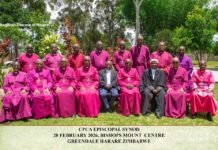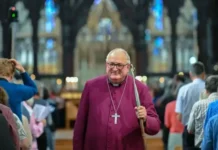After the annexation of four Ukrainian territories to the Russian Federation, the problem now arises of the ecclesiastical jurisdiction of the Orthodox Churches in these regions. They could be incorporated ex officio into the patriarchate of Moscow, however, causing new contrasts and divisions in what is already being called “the Donbass schism”.
The Russian Church is for the second time faced with the dilemma of ‘ecclesiastical annexation’, after that of Crimea in 2014. Eight years ago Patriarch Kirill chose not to subtract the peninsula’s eparchies and parishes from Kiev, trusting in the loyalty of the Ukrainian “patriarchal” jurisdiction, and thus contesting the Putinist gamble of “our Crimea”. Today, the patriarchate is totally aligned with the Kremlin, and Ukraine’s Orthodox “Muscovites” distanced themselves from Moscow at a synod in May, affirming their full ecclesiastical independence.
There are nine eparchies involved: Donetsk and Mariupol, Lugansk, Gorlov and Slavjansk, Berdjansk and Primorje, Rovenkov, Kherson and Tauride, Zaporožets, Novokhakovsk and Severodonetsk. In many churches in these territories, long occupied by the Russians, the priests had sided with the patriarchate, but others had kept to positions of expectation and reserve. Today, they are forced into very limited relations with the head of the Pzu (“Pravoslavnaja Zerkov Ukrainy”) Church, to which the abbreviation Mp (“Moskovskogo Patriarkhata”), led by Kiev’s Metropolitan Onufryj (Berezovskyj), now on “foreign soil” after the Putinist referendum-farce, should no longer be added.
If Kirill in 2014 seemed to want to distance himself from Putin, today he is isolated by a ‘providential’ Covid infection, about which many are joking because of the coincidence with the new imperial proclamations of annexation. The patriarch’s almost maniacal avoidance of the coronavirus, which he avoided for two years, is well known, while he is now confined to an ‘intensive care regime’ in bed, unable to communicate with the outside world.
Patriarchate spokesman Vladimir Legojda assured that “the Church respectfully accepts the will of the people and their choices of political and national affiliation”, without clarifying the details of ecclesiastical jurisdiction: “This question, if it is posed, will be addressed by the higher bodies of the ecclesiastical authority in the times that will be established”. Another exponent of the patriarchate, protoierej Nikolaj Balašov, explained that now “the priority is the reconstruction of the destroyed churches”, almost all of which were destroyed by Russian bombing, which does not predispose the local faithful to easy submission to Moscow’s authority.
For now, the care of the nine eparchies in the annexed territories will be based on humanitarian aid and reconstruction programmes. It is also unclear who will be entrusted with management at this juncture: in March, the patriarchate assigned responsibility for the “neighbouring foreign ecclesiastical structures” to Metropolitan Pavel (Ponomarev), a former exarch of Minsk who was recalled in 2020 because he was not sufficiently in line with Belarusian President Lukašenko. According to other patriarchate representatives, the care of the (former) Ukrainian territories should however be in the hands of an “interdicasterial working group” for the “newly acquired” eparchies, headed by Metropolitan Dionisij (Porubaj), moderator of the Moscow patriarchal curia.
Much will depend on the choices of the eparchies and parishes themselves and of the local clergy, in accordance with local traditions that see frequent fluctuations in the orientation towards the higher hierarchies, as is the case somewhat throughout the Orthodox world. The national patriarchal pyramid, in reality, does not have the same juridical force as the Roman papacy for Catholics, and often not even that of the episcopal conferences and diocesan curias, and it is not uncommon for issues to be resolved through local assemblies, which often result in heated quarrels and very unspiritual competitions. Not to mention that further forcing by the Moscow Patriarchate could lead to an even more total isolation of the Russian Church from the rest of world Orthodoxy.




[…] to this article Another Orthodox Schism in the Donbass Anglican Ink Spread the […]